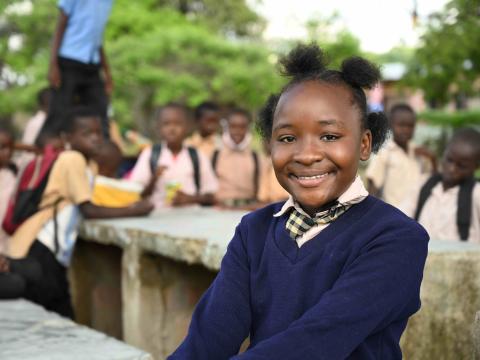Empowering futures: How IMPACT+ drives resilience and sustainability among Zambian adolescents

By Margaret Phiri, Child Protection & Participation Manager at World Vision Zambia and Julia Smith-Brake, Senior Advisor for Adolescents and Youth at World Vision International
Adolescents face huge and unique challenges in a quickly changing world. Along with an explosion of brain and body growth, adolescents around the world are experiencing displacement and migration, learning loss and school leaving due to COVID-19, conflict, and climate, onset mental health issues and high levels of sexual and physical violence.
World Vision implements a Positive Youth Development approach called IMPACT+ to partner with and work alongside adolescents to empower them with the competencies and connectedness needed to face an ever-evolving landscape.
IMPACT+ is a holistic, integrated approach to adolescent engagement that fosters the skills, behaviors, and attitudes necessary for participation in social, civic, and economic life. It encourages the development of confident, self-aware, and resilient young people who build positive and peaceful relationships and contribute positively to their communities via youth-led community projects.
In Zambia, World Vision's IMPACT+ clubs play a vital role in promoting the well-being of adolescents aged 12–18 and fostering community development. With a strong emphasis on meaningful child participation, the initiative has established over 200 clubs, with a membership of more than 4,000 active adolescent participants across nine out of ten provinces in Zambia. This effort is particularly significant in a country where over 50% of the population consists of adolescents and children. Notably, the clubs are intentional by prioritising inclusivity, actively involving children with disabilities during the enrolment process.
In response to the challenges posed by climate change, the IMPACT+ model has empowered adolescents through Community Service-Learning projects. Activities include cultivating drought-resistant crops like potatoes and cassava in school gardens and planting trees to combat soil erosion and water pollution. Some clubs have taken innovative approaches, conducting youth-friendly sensitization classes on climate-smart agriculture via social media and engaging in anti-litter campaigns in schools and communities. These efforts promote peer-to-peer learning, instilling valuable life skills and a sense of environmental stewardship among children.
Over 50 IMPACT+ clubs have forged collaborations with the government, including a partnership with the Ministry of Green Economy and Agriculture to promote climate-smart agriculture and raise awareness about deforestation and charcoal production. This collaboration has positively impacted over 700 learners and 25 teachers and school administrators at the district level. Notably, the clubs advocate for sustainable alternatives, such as using corncob waste instead of charcoal in rural communities.
During national and international events, IMPACT+ clubs actively appeal to civil society organizations and the government for increased funding to support future climate action. Some clubs have also addressed menstruation-related challenges by producing reusable sanitary towels, contributing to the reduction of school absenteeism and dropouts among girls. This intervention is especially crucial in rural areas where such challenges persist despite the introduction of free education by the government.
IMPACT+ club members have achieved commendable results, and with additional support and mentorship, they can achieve even more. The Community Service-Learning projects not only benefit adolescents but also uplift their families and communities, including those with disabilities. The success of these clubs underscores the importance of service-learning in schools and communities, celebrating the positive impact on adolescent well-being and overall community development.